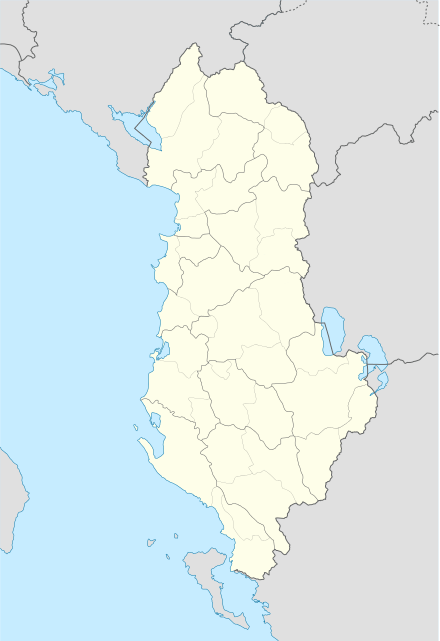Aliko
| Aliko | |
|---|---|
| Administrative Unit | |
 Aliko | |
| Coordinates: 39°52′N 20°5′E / 39.867°N 20.083°ECoordinates: 39°52′N 20°5′E / 39.867°N 20.083°E | |
| Country |
|
| County | Vlorë |
| Municipality(s) | Finiq |
| Time zone | UTC+1 (CET) |
| • Summer (DST) | UTC+2 (CEST) |
Aliko (in Albanian, Greek: Alyko, Αλύκο) is a village and a former municipality in the Vlorë County, southern Albania. At the 2015 local government reform it became a subdivision of the municipality Finiq.[1]
The population according to the 2011 census was 3,849.[2] however according to the civil offices it was estimated at 8,818,[3]
The municipal unit consists of the villages[4] Aliko,[5] Çaush, Neohor, Tremul, Rahullë, Pllakë, Jermë, Vurgu i Ri, Halo and Dritas which are inhabited solely by Greeks,[6] while Çukë is a mixed village with a Greek majority and small Muslim Cham Albanian minority (200).[6] The latest official census in Albania (2011), which has been widely disputed due to irregularities in the procedure,[7][8][9] and its results affected by boycott by part of the Greek minority,[10] shows that Albanians were the most numerous ethnic group (37,49%), followed by Greeks (27,90%).[11]
References
- ↑ Law nr. 115/2014
- ↑ "2011 census results" (PDF). Archived from the original (PDF) on 2016-03-04. Retrieved 2015-03-03.
- ↑ "Vlora's communes". Retrieved 13 January 2016.
- ↑ Greece – Albania Neighbourhood Programme Archived March 27, 2012, at the Wayback Machine.
- ↑ administrative seat of the former municipality
- 1 2 Kallivretakis, Leonidas (1995). "Η ελληνική κοινότητα της Αλβανίας υπό το πρίσμα της ιστορικής γεωγραφίας και δημογραφίας [The Greek Community of Albania in terms of historical geography and demography." In Nikolakopoulos, Ilias, Kouloubis Theodoros A. & Thanos M. Veremis (eds). Ο Ελληνισμός της Αλβανίας [The Greeks of Albania]. University of Athens. p. 34. "Στα πλαίσια της επιτόπιας έρευνας που πραγματοποιήσαμε στην Αλβανία (Νοέμβριος-Δεκέμβριος 1992), μελετήσαμε το ζήτημα των εθνοπολιτισμικών ομάδων, όπως αυτές συνειδητοποιούνται σήμερα επί τόπου. [As part of the fieldwork we held in Albania (November–December 1992), we studied the issue of ethnocultural groups, as they are realized today on the spot.]"; p. 51. "Ε Έλληνες... ΤΣ Τσάμηδες"; p. 51. "ÇUKE ΤΣΟΥΚΑ 2203 Ε + τσ(200)"; p.54. "ALIKO ΑΛΙΚΟ 1191 E; ÇAUSHI ΤΣΑΟΥΣΗ 718 E; TREMULI ΤΡΕΜΟΥΛΙ 203 E; NEOHORI ΝΕΟΧΩΡΙ (ΚΑΣΙΜ ΑΑΗ ΜΠΕΗ) 273 Ε; RAHULLA ΡΑΧΟΥΛΑ 375 Ε; JERMA ΓΕΡΜΑ 444 Ε; HALOJA ΧΑΑΟ (ΧΑΑΙΟ) 346 Ε; PLLAKA ΠΛΑΚΑ (ΜΕΜΟΥΣ ΜΠΕΗ) 489 Ε; DRITASI (FANARI) ΝΤΡΙΤΑΣ (ΦΑΝΑΡΙ/ΚΑΡΑΛΗ ΜΠΕΗ) 312 Ε; VURGO I RI (QENURJA) ΝΕΟΣ ΒΟΥΡΚΟΣ (ΚΑΙΝΟΥΡΙΟ) 460 Ε."
- ↑ "Final census findings lead to concerns over accuracy". Tirana Times. Archived from the original on 28 May 2014. Retrieved 26 May 2014.
- ↑ Likmeta, Besar. "Albania Moves Ahead With Disputed Census". Balkaninsight. Retrieved 26 May 2014.
- ↑ "Three Albanian journalists awarded with "World at 7 Billion Prize"". United Nations (Albania). Archived from the original on 28 May 2014. Retrieved 26 May 2014.
...the controversial CENSUS data
- ↑ "International Religious Freedom Report for 2014: Albania" (PDF). www.state.gov/. United States, Department of State. p. 5. Retrieved 20 October 2015.
Ethnic Greek minority groups had encouraged their members to boycott the census, affecting measurements of the Greek ethnic minority and membership in the Greek Orthodox Church.
- ↑ "Official 2011 census results per municipality".

